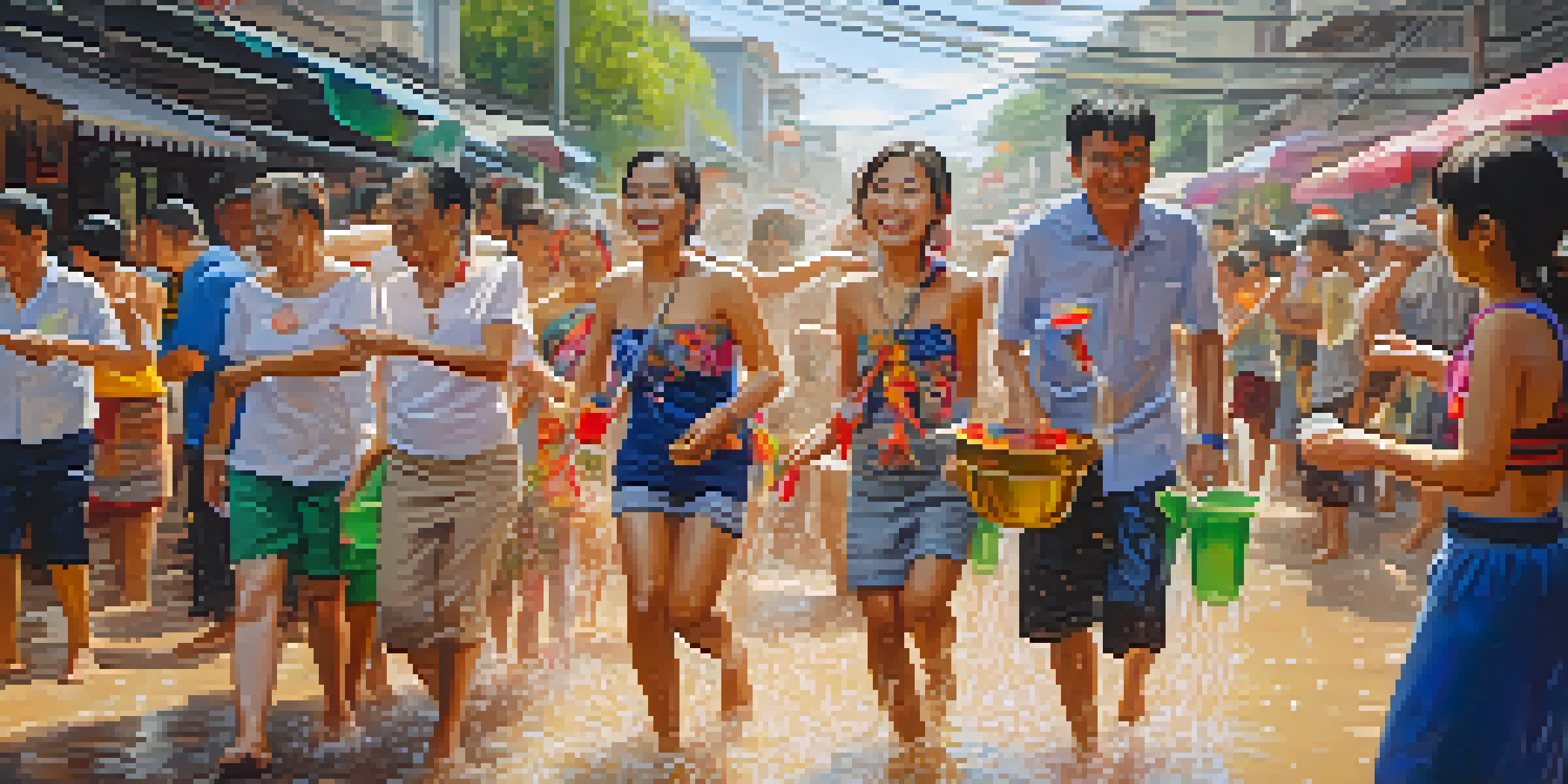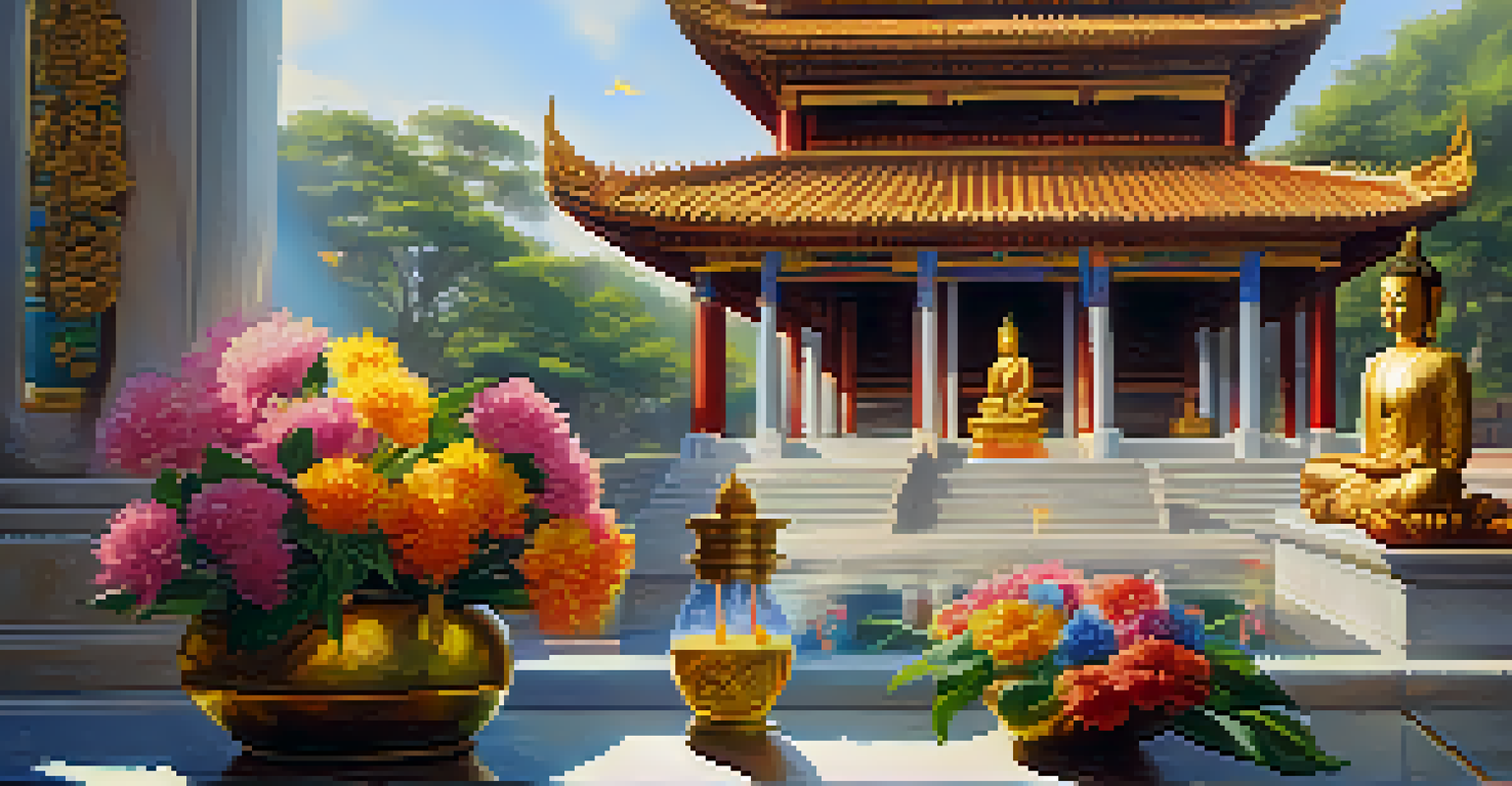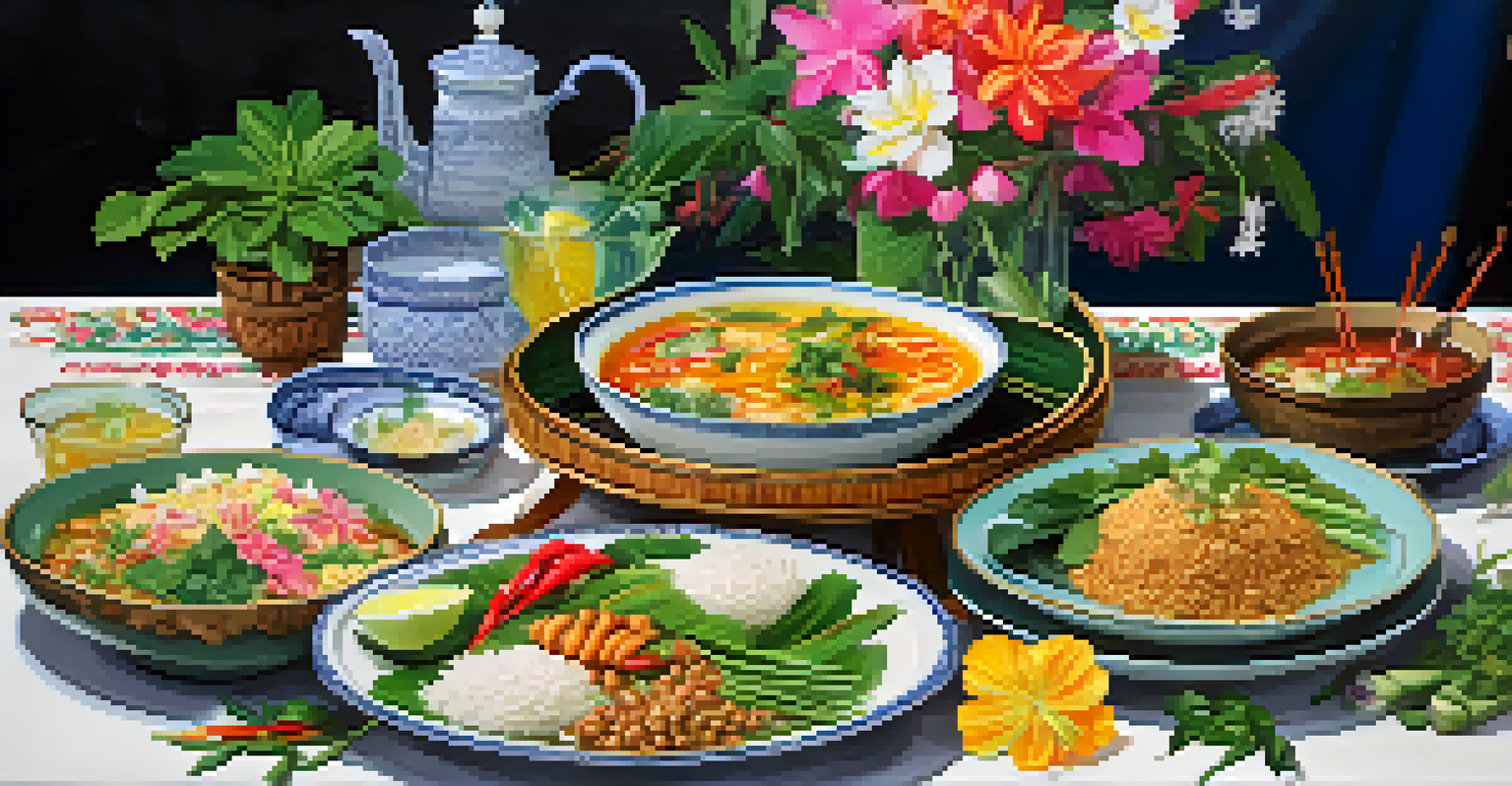The Significance of Water in Thai New Year Celebrations

Water as a Symbol of Purification in Songkran
During Songkran, Thailand's traditional New Year, water plays a crucial role in the purification rituals. People splash water on each other as a way to wash away sins and bad luck from the previous year. This act is not just fun; it symbolizes a fresh start and the cleansing of the spirit.
Water is the driving force of all nature.
The significance of water goes beyond mere fun; it is deeply rooted in Buddhist beliefs. Many locals visit temples to pour water over Buddha statues, a practice that signifies respect and the aspiration for a peaceful year ahead. This connection to spirituality enhances the overall meaning of the celebrations.
Additionally, the use of water during Songkran encourages community bonding. Friends and families gather to enjoy the festivities, creating a sense of unity and shared joy. This collective celebration of renewal strengthens social ties and promotes harmony among participants.
Water as a Means of Celebration and Joy
Water fights are a hallmark of Songkran, transforming the streets into vibrant battlegrounds filled with laughter and joy. Young and old alike participate, armed with water guns, buckets, and hoses, creating a playful atmosphere. This spirited interaction brings a sense of euphoria to the festivities, making it a highlight of the New Year.

The playful nature of these water battles serves as a reminder to embrace life's lighter moments. In a world often filled with stress, the joyous splashing of water encourages people to let go of their worries and enjoy the present. This carefree spirit is a major part of what makes Songkran so special.
Water Symbolizes Purification
During Songkran, water is used in rituals to wash away sins and represent a fresh start.
Moreover, the water-related activities extend beyond just splashing; they include traditional rituals like the pouring of scented water over loved ones. This act of blessing is a beautiful way to express love and appreciation, reinforcing bonds within families and communities. The intertwining of fun and tradition is what makes Songkran truly unique.
Cultural Significance of Water in Thai Traditions
Water has always held a significant place in Thai culture, representing life, fertility, and prosperity. This reverence is evident during Songkran, where the use of water reflects the agricultural roots of Thailand. As the country relies heavily on rice farming, the association of water with abundance is deeply ingrained in the cultural consciousness.
We never know the worth of water till the well is dry.
Historically, the Thai people have celebrated the arrival of the rainy season, essential for crops, with rituals involving water. This connection to agriculture emphasizes the importance of water not just in the New Year but throughout the year. It reminds everyone of the cycles of nature and the gratitude owed to it.
This cultural significance is further illustrated in local customs and beliefs. For instance, many Thai families have water-based ceremonies to bless their homes and ensure good fortune. By intertwining water with their cultural practices, the Thai people honor their heritage while celebrating the New Year.
Water as an Element of Respect and Gratitude
During Songkran, the act of pouring water symbolizes respect, particularly towards elders. Children and younger members of the family pour scented water over the hands of their elders as a gesture of gratitude and seeking blessings. This beautiful tradition highlights the importance of family ties and respect for one's heritage.
The water used in these rituals is often infused with flowers and fragrances, making it a sensory experience that enhances its significance. This thoughtful preparation reflects the care and love involved in the process. It’s a gentle reminder of the values that underpin Thai society, including respect and appreciation for one another.
Water Promotes Community Joy
The lively water fights during Songkran foster a sense of unity and shared happiness among participants.
Furthermore, this practice of pouring water transcends generations, allowing younger individuals to connect with their cultural roots. It fosters a sense of identity and continuity, ensuring that the values of respect and gratitude are passed down. In this way, water becomes a vessel for tradition and familial love.
Environmental Awareness Through Water Celebrations
In recent years, there has been a growing awareness about the environmental impact of water usage during Songkran. While the traditional water fights are iconic, they can also lead to excessive water waste. As a response, many communities are advocating for more sustainable practices during the celebrations.
This shift towards environmental consciousness is not just about conserving water but also about educating participants. Many organizations host workshops and campaigns to promote responsible water use and the importance of protecting natural resources. This blending of tradition with modern values demonstrates a commitment to both celebration and environmental stewardship.
By encouraging mindful water usage, communities can celebrate Songkran's joyous spirit while also preserving the very element that makes the festivities possible. This balance between enjoyment and responsibility is key to ensuring that future generations can continue to celebrate the New Year in a sustainable way.
The Role of Water in Thai Cuisine During New Year
Water is not only essential for cleansing during Songkran but also plays a vital role in Thai cuisine, especially during the New Year. Traditional dishes often incorporate fresh ingredients that rely on water for their growth, reflecting the season's bounty. Celebrating with food that honors nature's gifts ties the culinary experience to the overall festivities.
Many families prepare special meals that include dishes like 'Khao Chae,' a rice dish served with iced water and fragrant herbs. This dish is a refreshing treat during the hot season and embodies the spirit of Songkran. Sharing these meals emphasizes the communal aspect of the celebrations, bringing people together to enjoy delicious food.
Respect and Gratitude Through Water
Pouring scented water over elders during Songkran showcases respect and strengthens family bonds.
Water also symbolizes hospitality in Thai culture, making it an integral part of any celebration. Offering guests a refreshing drink or a dish prepared with care reflects the warmth and welcoming nature of Thai people. This connection between water and hospitality enhances the festive atmosphere, ensuring that everyone feels included and valued during the New Year.
The Future of Water in Thai New Year Celebrations
As Thailand continues to modernize, the role of water in Songkran is evolving. While traditional practices remain strong, younger generations are finding innovative ways to celebrate while respecting the customs. This evolution may include using technology to enhance the festivities, such as water-themed apps and games that maintain the essence of fun.
The integration of modern practices does not diminish the significance of water; rather, it enriches the celebrations by making them more accessible to everyone. By blending tradition with innovation, the celebrations can adapt while still honoring their roots. This adaptability ensures that the essence of Songkran remains vibrant and relevant.

Looking forward, it’s essential for the Thai people to maintain their respect for water as both a cultural and environmental resource. By fostering a culture of sustainability and respect, the future of Songkran can continue to be a joyous celebration that honors both heritage and the natural world. This balance will ensure that water remains a central element in Thai New Year celebrations for generations to come.